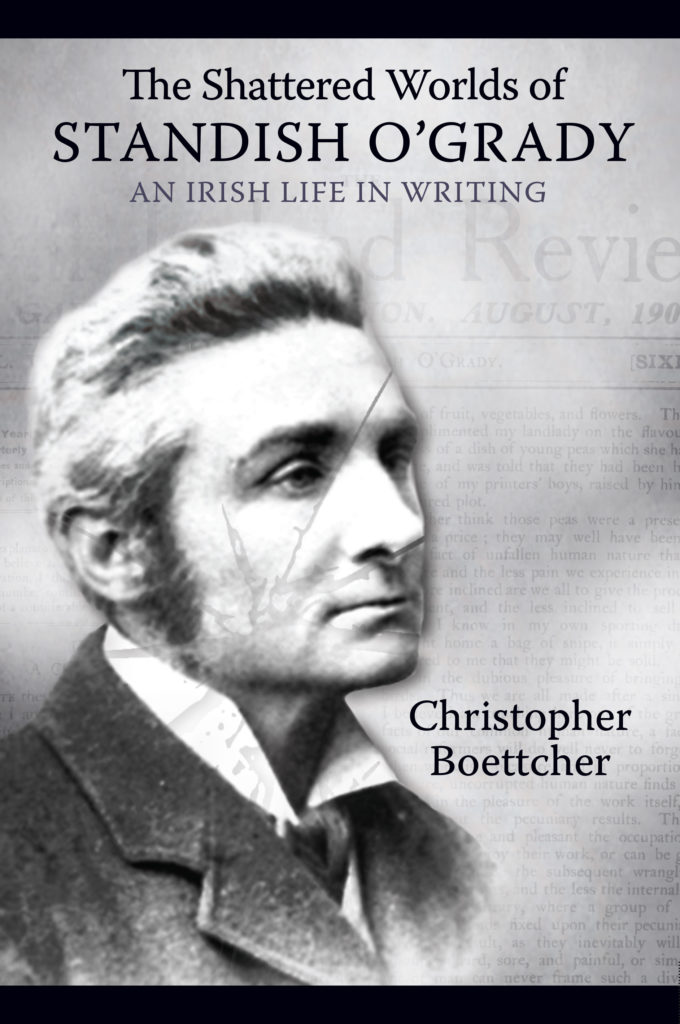Published June 2019; Four Courts Press; HB; €55; 978-1-846827853
Most readers of Standish O’Grady, Father of the Irish Literary Revival, probably wouldn’t find great, enduring value in his works. He was, however, deeply influential in the Ireland of his day. Young people read him for inspiration, and his peers among Ireland’s elite might have begun one of his works with the naïve hope of finding out a little more of what was going on around them. His first History of Ireland, published in 1878, engages with a century of intellectual conversation, and it joins that conversation with flashes of insight. If we are inclined to follow O’Grady’s thoughts deeper, we might find ourselves drawing scribbles on a page trying to understand just what he is getting at. When O’Grady is at his most visionary, the imagery he uses, a detailed description of dawn surveyed from some height, for instance, becomes a kind of metaphorical code that he combines and then later recombines with other images, less for aesthetic pleasure as to provide a vehicle for thought. We can then follow the shifting images from work to work, through the follow-up volumes of his History of Ireland and outward to his later writings when they began to manifest in his plans for Ireland’s future. By that point, of course, the images had also found themselves into the words of W. B. Yeats and others who had read him at vulnerable ages.
Surveying O’Grady’s works with that perspective in mind, his propensity for revision becomes the interest. It is fair to say that nearly every work drew in some way on the ideas and language of previously published material. He often found new insights by cutting and pasting whole passages of those mad works in novel combination, or he just rewrote them entirely under new titles. When he began this project with his self-conscious follow-up to his History of Ireland in 1879, he did so apologetically, as though compelled to correct a record that had been sullied by hubris. By the end of his life he wore his will to revise as a badge of honour.
Having become the historian, of a sort, O’Grady stepped up to become an advisor to Ireland’s political elite; he reinvented not just his words but his whole self-conception. Had he lived in our day, O’Grady would have easily found his place as a pundit on the television, playing a role as the sneering arch-conservative. In one of his most terrifying experiments from the mid 1880s, he urged his readers to follow the leader of the day only because he was a leader, because, as O’Grady estimated, he could unite society in his thrall and direct its energies to war and other great projects. Thankfully, O’Grady built his intellectual life on a protean foundation with a capacity to re-invent itself. Scholars have puzzled, for example, over O’Grady’s turn to anarchism, which he began to reveal in 1905 in the boldest gestures he could muster. The conversion was spurred by his writing in the All Ireland Review, a journal of arts and cultural affairs that he had created for himself and edited 1900-1907. He wrote most of it, he clipped and pasted was he was reading or found interesting, and he commented, usually reflexively, on everything. He also published his readers’ commentary and further discussion, and reading this “comments section” is most troubling for its interest. Here perhaps more than anywhere in his writings O’Grady’s self-reflections render him the Virgil figure whose words open for us the wider world of his day. The review is a rich prototype of the social media that most of us now use for ourselves as a matter of course, and it remains his most fascinating document of public introspection.

Christopher Boettcher is an Associate Professor of English at Castleton University where he specializes in General Education pedagogy and the scholarship of teaching and learning. He is the author of The Shattered Worlds of Standish O’Grady: an Irish life in writing (Four Courts Press, 2019)












